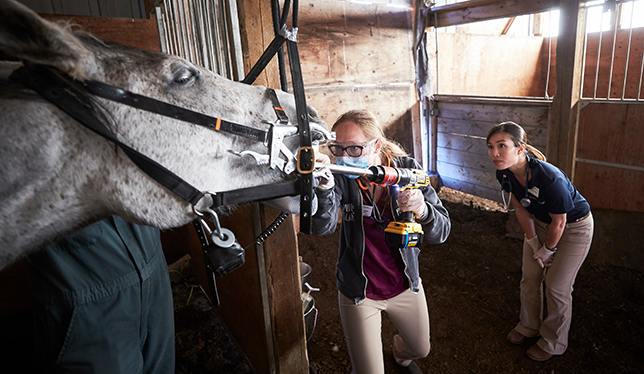A new rotation at the University of Calgary’s faculty of veterinary medicine is providing fourth-year students the chance to participate in hands-on equine care while engaging with Indigenous communities near the city. The two-week placement program ran for the first time this June, with four students spending one week each at the Tsuut’ina and Siksika Nations just outside of Calgary. With supervision from their instructors, the students administered services like vaccinations, dental care and lameness exams.
The rotation began with efforts by Jean-Yin Tan, one of the faculty’s instructors in equine clinical sciences. For the past few years, Dr. Tan has been bringing second-year students to Tsuut’ina for a one-day equine care course. Between that class and this new rotation, she says the school has provided over $50,000 in free veterinary care to more than 100 horses.

The idea took shape when Dr. Tan learned that horses in the two communities are underserved when it comes to routine veterinary care due to the challenges of getting an equine specialist to rural settings. A colleague connected Dr. Tan to a well-known horse owner in Tsuut’ina, who served as a community liaison to get the program running there, which led to a similar setup in Siksika. “I think of it as a partnership – I would not be able to just go in there and do anything myself,” Dr. Tan says. “They [the community members] organized it all for me, and I would never have been able to do it without them.”
On the first day of the rotation, Dr. Tan invited representatives from the university’s Native Centre (now called the Writing Symbols Lodge), including an elder, to host a talk on Indigenous ways of knowing, the human-animal bond, and what horses mean in Tsuut’ina and Siksika cultures. It was eye-opening, even for an experienced veterinarian like Dr. Tan. “Typically in vet practice, the routine is to go out there, get consent, and check the boxes,” she says. “I realized very quickly that that was not the way to go about it – it was about establishing a relationship first, and that verbal communication is more important than written.”
One of the students, Erica Ward, says this is what made the rotation feel like more than just a lesson in equine care. “I gained a perspective of the Indigenous relationship with horses and a deeper understanding of their relationship to animals, and how diverse and complex their communities are,” she says.
The program fits into the faculty’s One Community, One Health strategic plan, which includes an Indigenization component meant to encourage partnerships with and learning from Indigenous peoples. Dean Baljit Singh says that Indigenous ways of knowing play have an important place in the complex, often vitriolic debate about the value of animals in our society. “People might say, ‘What does veterinary medicine have to do with Indigenous cultures?’,” he says, “But at a deeper level, it comes to understanding the central value of animals, human life and environmental health, and I think there is so much to learn from the Indigenous communities and the way they live their lives, so that has to be part of the curriculum.”